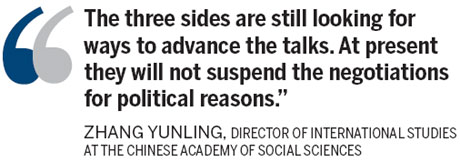Trilateral FTA talks still at exploratory stage
China, Japan and South Korea started a second round of talks on Tuesday over the establishment of a free trade agreement in what is considered by close observers to be still at the exploratory stage.
"The first round of negotiations witnessed big differences among the three sides," said Zhang Yunling, director of International Studies at the Chinese Academy of Social Sciences. "The talks are still at the technical level as the parties seek ways to reach a common view on the negotiation framework, including sensitive areas for each country. It may take two to three rounds of talks before they can get to substantive negotiations."

In November 2012, the three countries started making moves to build an FTA in Northeast Asia. It will be an important component of the Regional Comprehensive Economic Partnership once established. The first round of negotiations was concluded in March in Seoul, covering issues including mechanisms, negotiation methods and problem areas.
Tuesday's second round of negotiations in Shanghai will last until Friday, according to China's Ministry of Commerce.
The talks will cover the cargo and service trade, rules on origins, customs procedures, trade remedies, intellectual property rights and e-commerce, Xinhua News Agency quoted Yu Jianhua, a representative of China's international trade negotiations, as saying on Tuesday.
A third round will be held in Japan at the end of the year.
"The second round of talks will probably not make pragmatic progress because strained ties in the region will not be conducive to success," said Song Hong, an economist with the Institute of World Economics and Politics under the Chinese Academy of Social Sciences.
Japan has maritime disputes with China and South Korea. China has ruled out the possibility of an upcoming leaders' summit with Japan. However, Isao Iijima, a close adviser to Japanese Prime Minister Shinzo Abe, said on Sunday that Abe could hold a summit with President Xi Jinping in the "not-too-distant future".
"The three sides are still looking for ways to advance the talks. At present they will not suspend the negotiations for political reasons," Zhang said. "But political disputes will greatly affect the progress of the negotiations at the substantive stage and will demand the consensus of the leaders on key issues to further advance them.
"All in all, the road for establishing the trilateral FTA will not be smooth in view of the remarkable differences in the economic structures of the three countries and tight ties in the region."
China, Japan and South Korea have differences in market and consumption structures that have increased barriers and caused friction over trade and investment, the Economic Information Daily quoted Sun Yuanjiang, deputy director-general of the commerce ministry's international department, as saying.
Sun added that difficulties also come from concerns each country has in certain sensitive areas. They include agriculture, steel and shipbuilding in Japan, energy, clothing and textiles and the agricultural and aquatic products industry in South Korea and chemicals, automobiles, finance and retail in China.
The parties have experienced increasingly close economic and trade relations in recent years. In 2012, the three countries' combined GDP amounted to $15 trillion, accounting for about 20 percent of the world's and 70 percent of Asia's total. Bilateral trade between China and Japan reached $329.4 billion last year, while China-ROK trade registered $256.3 billion.
The trilateral FTA, once established, will forge a common market with a population of 1.5 billion, the world's third-largest economic grouping.
"While the trilateral FTA aims to open up markets and enhance industrial integration, China should prioritize the establishment of the Regional Comprehensive Economic Partnership , which can compete with the United States-led Trans-Pacific Partnership agreement with regard to its size and act as a model favoring emerging countries with a looser economic environment and stronger cooperation," Zhang said.

























